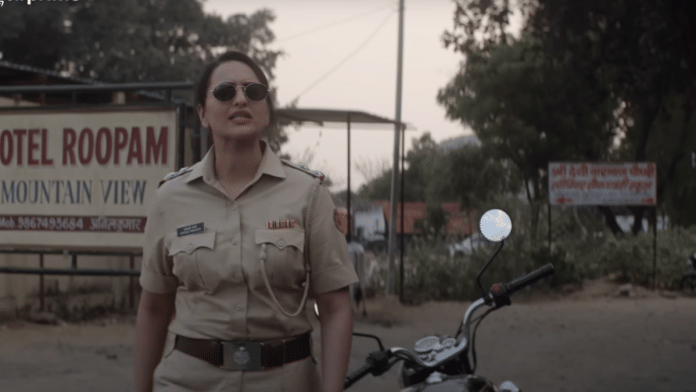
Thank you dear subscribers, we are overwhelmed with your response.
Your Turn is a unique section from ThePrint featuring points of view from its subscribers. If you are a subscriber, have a point of view, please send it to us. If not, do subscribe here: https://theprint.in/subscribe/
I read Arvind Kumar’s piece about the Amazon Prime show Dahaad on The Print. The piece makes points that I from my position of immense privilege had failed to see and hence found sobering and enlightening. That said, there are many reasons I recommend the Sonakshi Sinha starrer:
The suspense and social commentary
I am not a fan of slasher flicks or stories about serial killers, but found Dahaad engrossing – not so much a whodunit as much as a whydunit and howdunit. It is a series that shines an unrelenting light on some of our most intractable social issues: caste, women’s rights, communal politics, gender discrimination, social hierarchies and more.
Sinha plays the cop Anjali who, while trying to trace a missing woman, unearths the mysterious, supposed suicides of 27 women. A clear pattern emerges connecting these deaths and Anjali sets out on a mission to find the man behind the evil.
Caste, politics of opportunism and class divides
The show highlights contrasting ways the police handle two reports of missing women: one from a powerful, politically connected Thakur family, the other from a Dalit man. The woman from the Thakur family has eloped with a Muslim man, so of course there is the political mileage to be made from this.
While the police move with swift alacrity in the case involving the Thakur woman, the Dalit man struggles to even be heard by the police. The series is refreshing in the way that it makes no attempt to pander to the ‘Good Muslim’ trope. It presents characters with Muslim names routinely and as a matter of fact.
Caste and class divides are a leitmotif in the series: It is the police man who lights agarbattis each time someone from a ‘lower’ caste enters his room. It is the caste slurs that Anjali Bhaati continues to face even though her father had changed the family name to avoid persecution. There also emerges a pattern of the kind of women who are targeted by the killer: slightly older, from poor backgrounds, pressured to marry, and with little or no hope of bettering their lives.
Every working woman ever
Anjali is mocked and cat-called for being a woman in uniform, for riding a motorcycle, being a martial arts expert, for working all hours. Her mother berates her for her commitment to her job and is consumed by the need to get her daughter married. There is no family support or admiration for a woman doing her job brilliantly; only impatience and recrimination for what is seen as unorthodox and hence reprehensible behaviour. Indian women are familiar with all of this.
The marginalised Indian woman’s experience
Semi-arid Rajasthan, with its stark, relentless and hostile landscape is a fitting metaphor for the kind of lives women live; particularly the victims of the killer. These women live impoverished, powerless, drab, hemmed-in lives. Some of their families often care so little for them and their wellbeing that they do not even report their disappearance. The women are a shameful reality because of their unwed status now that they are missing, not having to pay a dowry is one less burden upon a poor family’s already stretched resources.
As the story unfolds we realise how female agency is almost entirely absent in the lives of the victims. This makes it easy for the serial killer to gain their trust quickly with the merest scrap of affection; the smallest hope of a better life. While I enjoyed how Anjali shouts down the men who cat-call her, I despaired at the colourless, joyless lives of so many of the women portrayed.
Hugely watchable
From the mild mannered killer to the prickly female cop charting her own course, Sinha’s protagonist and Vijay Varma’s antagonist are pitch perfect. The upright cop supporting his daughter (Gulshan Devaiah as SHO Devi Lal), to the conflicted woman having an extra marital affair because of an emotional absent husband (Zoa Morani as Vandana) are perfectly cast. The director has made excellent use of Sohum Shah to create the layered, highly believable character of SI Parghi.
The social issues are dealt with in subtle, non-preachy ways. Caste, dowry, women’s rights, communalism, gender and class divides, even parenting and sex education are deftly woven into the narrative. The show is mercifully devoid of gore and the expletives don’t seem forced.
It does flag a bit in the middle, and as a viewer I wanted the bad guy to be caught and all the women to be safe already. However, the story is engrossing till the end – I was literally on tenterhooks. The last scene, where Anjali reverts to her original surname was for me, a fist pump moment. Watch Dahaad if you haven’t already – even if you, like me aren’t a huge Sonakshi Sinha fan.
These pieces are being published as they have been received – they have not been edited/fact-checked by ThePrint.


COMMENTS